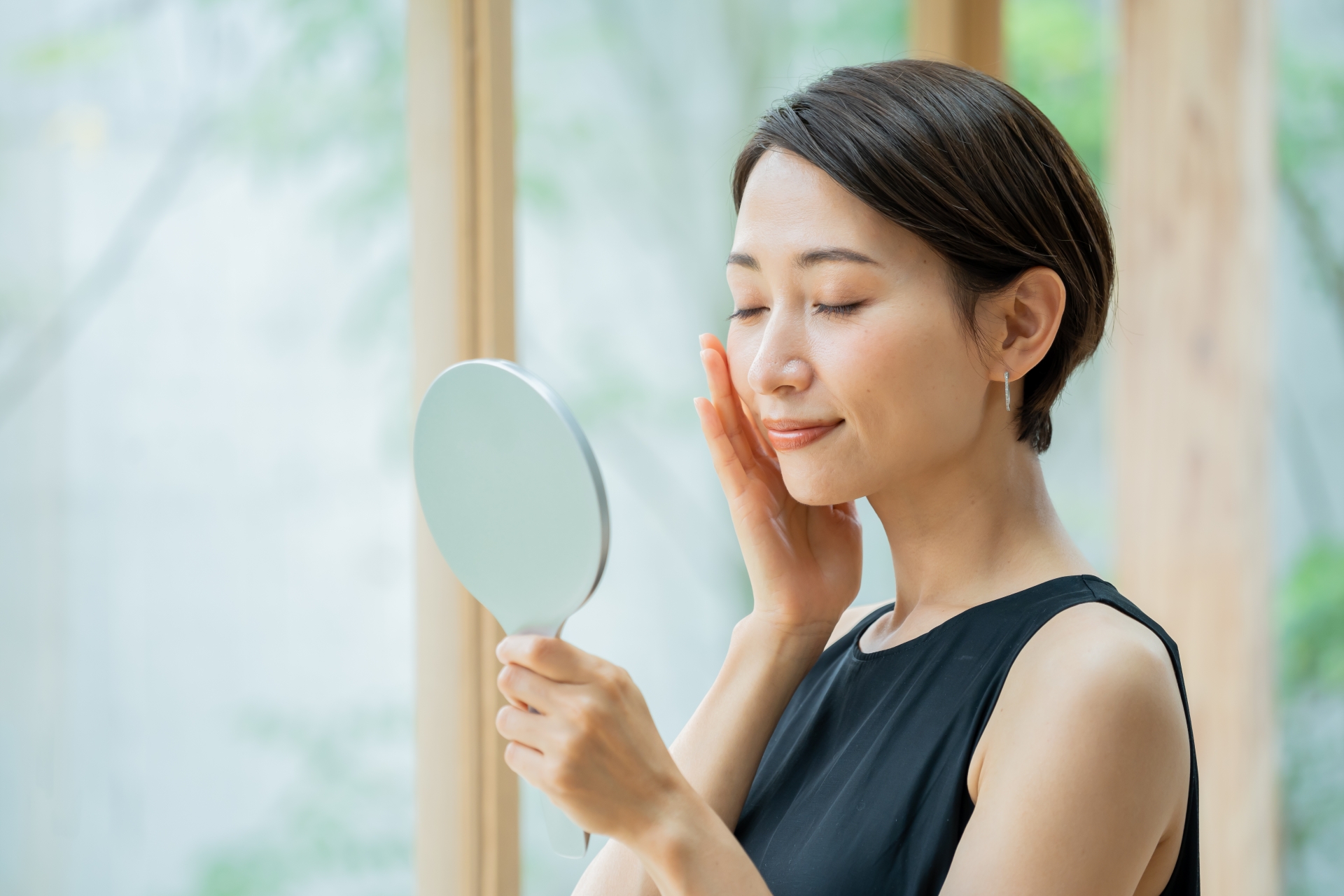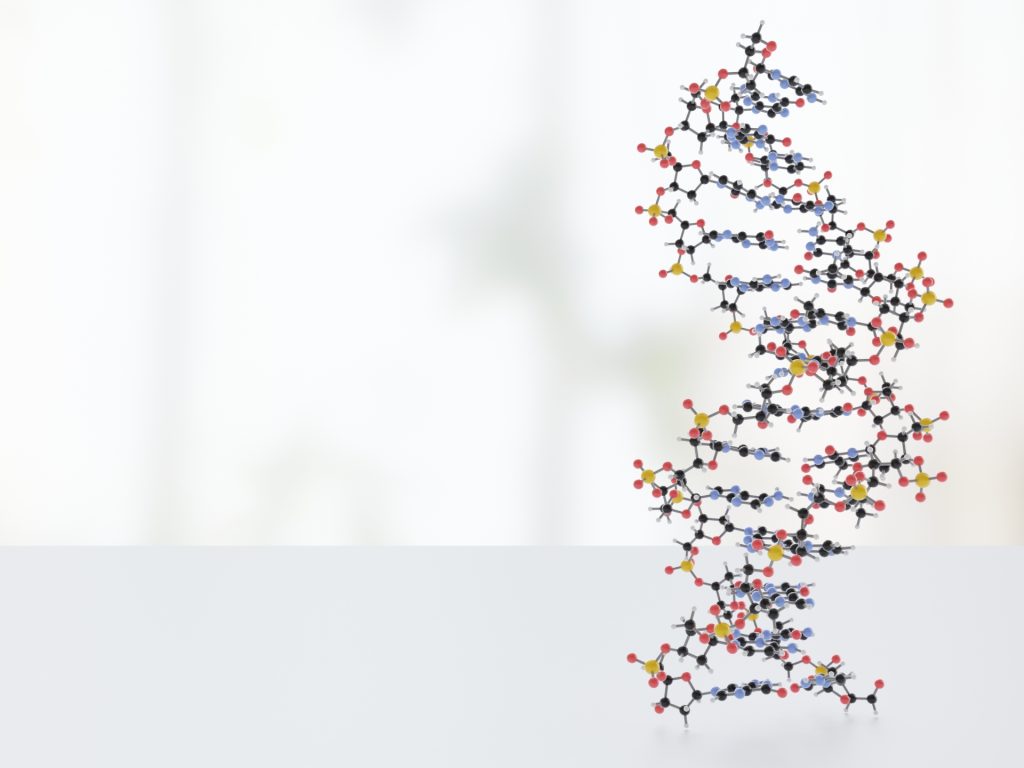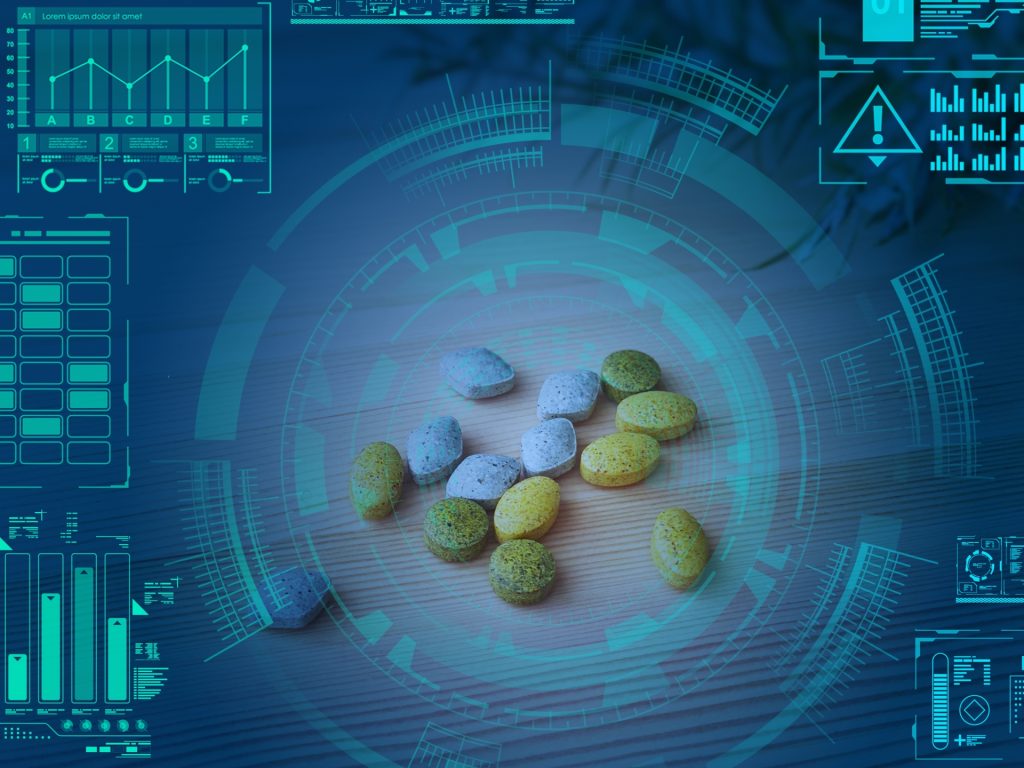
Recent studies have shown that genetic factors are deeply involved in skin aging. Understanding the influence of genes and practicing skin care and lifestyle habits based on this understanding can delay skin aging. This article details the genes that are important in maintaining skin youthfulness, their functions, epigenetics (acquired changes in gene expression), and beauty strategies that utilize them.
Genes involved in skin aging
Both external factors, such as UV radiation and oxidative stress, and genetic factors are involved in skin aging. In particular, the following genes are considered important in maintaining skin youthfulness
1. COL1A1 gene (collagen production)
The COL1A1 (collagen type I alpha 1 chain) gene is responsible for collagen production, which is important for skin elasticity and firmness. Mutations in this gene cause collagen to degrade more easily, leading to wrinkles and sagging skin.
Methods to activate the COL1A1 gene
- Consume foods high in vitamin C (citrus fruits, bell peppers, broccoli)
- Use of skin care products containing retinol (vitamin A derivative)
- Thoroughly protect against ultraviolet rays and prevent collagen degradation
2. SIRT1 gene (longevity gene)
The SIRT1 (Sirtuin 1) gene is responsible for preventing cellular aging and promoting DNA repair. When the activity of this gene is reduced, the skin’s ability to repair itself is impaired, resulting in the development of wrinkles and sagging skin.
How to activate the SIRT1 gene
- Resveratrol (red wine, grapes, peanuts)
- Moderate calorie restriction (fasting)
- Incorporate foods containing polyphenols (cacao, green tea)
3. MC1R gene (resistance to UV damage)
The MC1R (melanocortin 1 receptor) gene is involved in skin color and resistance to UV light. Mutations in this gene make the skin more susceptible to UV damage and increase the risk of spots and wrinkles.
How to prevent UV damage
- Use sunscreen (SPF 30 or higher) daily
- Consume foods with antioxidant properties (tomatoes, blueberries)
- Protect against UV rays with hats and sunglasses
Epigenetics and skin youth

The function of genes is not fixed at birth, but is altered by lifestyle and environment. This phenomenon is called “epigenetics. In order to maintain skin youthfulness, it is important to direct epigenetic changes in a positive direction.
1. Methylation and histone modification
DNA methylation and histone modifications serve to switch genes on and off. This can delay skin aging and enhance repair functions.
How to take advantage of epigenetics
- Consume foods high in folic acid and B vitamins (spinach, liver)
- Make moderate exercise a habit and improve blood flow
- Manage stress and reduce cortisol secretion
Genetically Based Skin Care Strategies
Understanding the genetic characteristics of the skin and applying the appropriate skincare regimen can make aging more effective.
1. How to choose skin care by genotype
| genotype | Skin Features | Optimal skin care |
| COL1A1 mutation present | Prone to wrinkles and sagging | Cosmetics containing vitamin C and retinol |
| Decreased SIRT1 activity | Easy to dry out and age easily | Skin care containing resveratrol and niacinamide |
| MC1R mutation present | Prone to spotting due to UV rays | High SPF sunscreen, antioxidant serum |
2. Custom skin care using genetic testing
Recently, a service has emerged that suggests personalized skincare products based on genetic testing. By selecting beauty ingredients that match one’s genotype, more effective skin care can be achieved.
Interaction between genes and lifestyle
Genes influence skin aging, but they are not the only factors that determine skin youthfulness. Lifestyle and environmental factors are also involved in gene expression, and proper management of these factors can delay skin aging.
1. Diet and Skin Health
Considering the impact of genes on skin aging, active intake of certain nutrients can help keep the skin young.
Nutrients for skin and their functions
| nutrient | Major Foods | Effects on skin |
| vitamin C | Citrus fruits, bell peppers, broccoli | Promotes collagen production, antioxidant action |
| vitamin E | Nuts, avocado, olive oil | Reduction of UV damage, skin moisturizing |
| omega-3 fatty acid | Salmon, chia seeds, walnuts | Reduces inflammation and maintains skin elasticity |
| polyphenol | Green tea, red wine, blueberries | Antioxidant action, epigenetic regulation of gene expression |
| Coenzyme Q10 | Meat, soybeans, fish | Mitochondrial activation, improved skin energy metabolism |
2. Stress and skin aging

Stress is one of the factors that accelerate skin aging. In particular, chronic stress increases cortisol (stress hormone) secretion and accelerates collagen degradation.
How to Manage Stress
- Incorporate mindfulness meditation (inhibits the release of stress hormones)
- Deep breathing and yoga to regulate the autonomic nervous system
- Ensure adequate sleep and promote skin repair
- Drink relaxing herbal teas (chamomile, lavender)
3. Exercise and skin rejuvenation
Moderate exercise helps maintain youthful skin by stimulating blood flow and providing the skin with the oxygen and nutrients it needs.
Good exercise habits for skin
- Aerobic exercise (walking, jogging) → enhances blood circulation and antioxidant activity
- Strength training (squats, dumbbell exercises) → Promotes secretion of growth hormone and supports skin regeneration
- Yoga and stretching → Stress reduction, hormonal balance adjustment
Personalized beauty using genetic testing
In recent years, personalized beauty using genetic testing has been attracting attention. Based on an individual’s genetic information, optimal skincare and lifestyle recommendations can be made, enabling more efficient aging care.
1. Skin care using genetic testing
Genetic testing can provide the following information
| inspection results | Skin Properties | Recommended Skin Care |
| Collagen degradation is rapid. | Prone to wrinkles | Cosmetics containing vitamin C and peptides |
| Low UV resistance | Easily stained | High SPF sunscreen, vitamin E |
| Weak antioxidant capacity | Dullness is noticeable | Serum with polyphenols |
2. Gene-based custom supplements
Based on the results of genetic testing, custom supplements can be utilized to supplement the required nutrients.
Recommended Supplements by Genotype
| genotype | Recommended Supplements | effect |
| Collagen degradation is rapid | Collagen peptide, Vitamin C | Maintains skin elasticity |
| Low UV resistance | Lutein, astaxanthin | Protects skin from UV damage |
| Low SIRT1 activity | Resveratrol, niacinamide | Promotes DNA repair |
Genetic Research and Future Beauty Technologies

1. Potential of Gene Editing Technology for Skin Care
Advances in gene editing technologies such as CRISPR-Cas9 are expected to make it possible in the future to directly manipulate genes involved in skin aging and delay aging.
Expected Future Beauty Technology
- Prevention of spots and wrinkles by gene editing
- Stem cell therapy to promote skin cell regeneration
- AI-based genetic analysis and beauty customization
2. Gene Therapy and the Use of Epigenetics
Beauty products based on epigenetics are being developed, and technology is evolving to reduce age-related skin changes by controlling gene expression.
Expected beauty ingredients in the future
- Epigenetic components (peptides that regulate histone modifications)
- DNA repair promoting ingredients (niacinamide, resveratrol)
- Stem cell culture fluid that promotes cell regeneration
Real-life examples of skin quality improvement using genetic testing

Many successful skin care and lifestyle modifications based on genetic testing have already been reported. Here are some specific examples of how genetic information can be used to maintain skin youthfulness.
1. Cases of genotypes with low UV tolerance (MC1R mutation)
background
Ms. A, a 35-year-old woman, had been prone to freckling since childhood and had a reddish skin tone that quickly turned red when she got sunburned. Genetic testing revealed that she had a mutation in the MC1R gene and low protection against UV rays.
Practiced Care
- Use SPF 50+ sunscreen daily and reapply every 2 hours
- Active intake of antioxidant vitamins C and E
- Repair DNA damage with niacinamide serum
- Wear a UV hat and sunglasses
result
After 6 months, the incidence of skin blemishes has decreased and the color of freckles has faded. In addition, UV-induced redness was reduced and the overall skin tone became more even.
2. Case of a genotype with rapid collagen degradation (COL1A1 mutation)
background
Mr. B, a male in his 40s, had rapidly developed sagging skin and fine wrinkles since his late 30s. Genetic testing revealed that he had a mutation in the COL1A1 gene and was a type that degrades collagen quickly.
Practiced Care
- Collagen peptide supplements taken daily
- Introduce skin care containing retinol to promote turnover
- Moisturizing care including hyaluronic acid to enhance skin moisture retention
- Conscious of high-protein diet (chicken, fish, eggs)
result
After four months, fine lines and wrinkles were less noticeable and skin elasticity improved. Six months later, sagging of the facial line also decreased, giving a more youthful appearance.
3. Cases of genotypes with low antioxidant capacity (SOD2 mutation)
background
Ms. C, a 50-year-old woman, was concerned about the dullness of her face and the roughness of her skin. Genetic testing revealed that she had a mutation in the SOD2 (superoxide dismutase) gene and low antioxidant capacity in her body.
Practiced Care
- Daily intake of polyphenols (green tea, blueberries)
- Using a serum that combines astaxanthin and vitamin C
- Facial massage to promote blood circulation
- Detox in hot springs and saunas on a regular basis
result
After 3 months, skin dullness was reduced and clarity improved. Blood circulation improved and skin became plumper and softer.
Skin aging mechanism at the genetic level

1. Relationship between telomere shortening and skin aging
There is a limit to the number of times a cell can divide, and an indicator of this is the telomere (structure at the end of chromosomes). When telomeres become short, the ability of cells to divide decreases and skin turnover is delayed, causing wrinkles and sagging.
How to slow telomere shortening
- Omega-3 fatty acids (salmon, nuts)
- Make moderate exercise (aerobic and strength training) a habit
- Reduces stress and improves sleep quality
2. Mitochondrial dysfunction and lack of skin energy
As mitochondria, which are responsible for the energy production of skin cells, decline, collagen production and repair functions are impaired. In particular, recent studies have shown that a decrease in NAD+ (nicotinamide adenine dinucleotide) is involved.
How to Activate Mitochondria
- Consume foods that increase NAD+ (edamame, avocado, yeast)
- Moderate fasting (Intermittent Fasting) to activate mitochondria
- Use of coenzyme Q10 supplements
The Future of Genetic Beauty
1. Beauty Personalization Using AI and Genetic Data
In recent years, the development of AI-based genetic analysis technology has led to the development of custom skincare products tailored to individual skin types.
Expected Technology
- AI analyzes genetic data and suggests optimal beauty ingredients
- Providing tailor-made serums according to individual skin types.
- Real-time skin condition monitoring and gene expression adjustment
2. Next Generation Anti-Aging with Stem Cell Therapy
In the field of genetic beauty, skin regenerative medicine using stem cells is also attracting attention. It is becoming possible to rejuvenate aging cells by utilizing stem cells.
Benefits of Stem Cell Aesthetics
- Promotes repair of damaged cells
- Enhanced collagen and elastin production
- Normalizes skin turnover and improves spots and wrinkles
Evolution of Next Generation Skin Care through Genetic Analysis

The skin care industry is rapidly evolving as a result of advances in genetic research. Personalized beauty that utilizes individual genetic information is now possible, and approaches that are distinctly different from conventional general skin care are attracting attention.
1. Beauty Technology Using Genetic Data
Integrating Genetic Analysis and Skin Care with AI
AI (Artificial Intelligence) is responsible for analyzing large amounts of genetic data and suggesting the best skin care for individual skin types.
Features of AI Skincare
- Predicts risk of skin aging based on genetic data
- Identification of cosmetic ingredients suitable for the individual’s constitution
- Monitors skin condition in real time and suggests appropriate care methods
Examples of DNA Custom Skin Care
There are already skin care brands on the market that utilize genetic analysis and offer products based on individual DNA data.
| brand name | feature | price range |
| Skintelli | Optimal skin care ingredients based on genetic data | high price range |
| HomeDNA | DNA testing at home and providing beauty products according to the results | mid-priced |
| Neogen Dermalogy | Genetically based anti-aging ingredients formulated | Medium to high price range |
In the future, these technologies are expected to evolve further, making it easier and more suitable for individual skin care.
2. Gene Editing and the Future of Skin Care
With the development of gene editing technologies such as CRISPR-Cas9, it may be possible to control skin aging at the genetic level in the future.
The Potential of Gene Editing for Skin Care
- Genetic modification to slow collagen degradation
- Controls melanin production and prevents the development of blemishes
- Development of technology to repair DNA damage caused by ultraviolet rays
If such technologies are put to practical use, it may be possible to fundamentally prevent skin aging.
Epigenetics and Skin Rejuvenation

By utilizing epigenetics (acquired changes in gene expression), even those who are genetically at risk for skin aging can maintain youthful skin with proper care.
1. Histone Modification and Skin Care
Histone modifications are an important epigenetic mechanism that regulates gene expression. It is believed that by modulating histones, the expression of aging-related genes can be reduced.
Nutrients that promote histone modification
- Sulforaphane (broccoli) → antioxidant action, DNA repair promotion
- Resveratrol (red wine, grapes) → activation of sirtuin gene
- EGCG (green tea) → Inhibits inflammation and prevents cellular aging
As epigenetics research progresses, it is expected that new skin care products targeting histone modifications will be developed in the future.
2. Epigenetic changes due to lifestyle
Good habits improve gene expression in the skin.
- Regular diet → regulates genetic methylation and prevents skin aging
- Moderate exercise → promotes epigenetic changes and supports cell rejuvenation
- Stress management → reduces cortisol overproduction and prevents skin inflammation
On the other hand, smoking and excessive UV exposure are considered habits that should be avoided because they disrupt gene methylation and accelerate aging.
Comprehensive cosmetic strategies using genetic testing
1. Skin care routine using genetic information
| morning | lunch | evening |
| Vitamin C serum + high SPF sunscreen | Consume antioxidant foods (blueberries, green tea) | Retinol serum + collagen supplement |
point
- Choose skin care ingredients based on genetics (antioxidant, UV protection, collagen maintenance)
- Combine diet, exercise, and sleep to promote epigenetic changes
- Stress management and minimizing the effects of cortisol
2. Entering the Era of Individual Optimization Using Genetic Testing
In the future, the price of genetic testing will decrease and more people will be able to easily utilize their DNA information.
Expected Future Beauty Technology
- Automatic formulation of individually optimized skin care ingredients
- Integrates AI and genetic data to optimize skin condition in real time
- Anti-aging treatment using DNA repair technology
With these advancements, the era of “it’s a genetic skin condition, so it can’t be helped” is coming to an end.
Genetic Analysis and the Future Prospects of Skin Care

Developments in genetic research are moving skin care from the era of using products for all to the era of adopting individually optimized beauty strategies. It is predicted that further technological innovation will lead to the generalization of beauty strategies based on individual genetic information.
1. Skin Anti-Aging by Gene Editing
Advances in gene editing technology, including CRISPR-Cas9 technology, may lead to the development of methods to radically inhibit skin aging.
Expected applications of gene editing
- Strengthens the COL1A1 gene and prevents collagen degradation
- Regulates the MC1R gene to improve UV tolerance
- Activates the SIRT1 gene and slows cellular aging
Currently, these approaches are being studied in the animal testing phase and are expected to be safely applied to humans in the future.
2. Fusion of AI and Biotechnology
Artificial intelligence (AI) systems are being developed to analyze genetic data and provide optimal beauty ingredients.
AI at the forefront of beauty
- Automatic formulation of skin care products based on an individual’s genotype
- Real-time skin condition monitoring and optimal care recommendations
- Predicting beauty trends using big data analysis
AI-based beauty brands have already emerged, and technology is evolving to achieve optimal ingredient formulations for each user.
Epigenetics and lifestyle optimization
Gene expression can be modulated by environmental factors and lifestyle. By promoting epigenetic changes, it is possible to maintain skin youthfulness for a longer period of time.
1. Diet and Epigenetics
Certain foods have been shown to affect epigenetics and regulate gene expression.
Foods that promote epigenetics
- Sulforaphane (broccoli) → antioxidant effect, histone modification regulation
- Resveratrol (red wine, peanuts) → SIRT1 gene activation
- Polyphenols (cacao, green tea) → reduce inflammation and decrease expression of aging genes
2. Stress management and gene expression
Chronic stress causes an overproduction of cortisol, which accelerates skin aging.
How to prevent stress-induced skin aging
- Make mindfulness meditation a habit and increase stress tolerance
- Moderate exercise (yoga, walking) suppresses stress hormones
- Ensures good sleep and maximizes cellular repair at night
Studies show that chronic stress reduces the skin’s barrier function and causes inflammation, making stress management an important factor for beautiful skin.
Examples of personalized skin care practices
Genetic testing can be used to develop beauty strategies that are appropriate for individual skin types. Below are some specific examples of genotype-based skin care
1. Genotype-specific skin care programs
| genotype | Skin Features | Recommended Skin Care |
| COL1A1 mutation present | Collagen degradation is rapid. | Vitamin C serum, collagen supplements |
| MC1R mutation present | Susceptible to ultraviolet rays | High SPF sunscreen, antioxidant serum |
| Decreased SIRT1 activity | Susceptible to ultraviolet rays | Skin Care with Resveratrol |
2. Genetically Informed Beauty Routines
| morning | lunch | evening |
| Vitamin C + Sunscreen | Polyphenol intake | Retinol serum + collagen supplement |
point
- Select skin care ingredients according to genotype
- Adopt lifestyle habits that promote epigenetic change
- AI-based, individually optimized beauty programs
Future Prospects for Genetic Beauty

With the advancement of technology, “personalized skin care based on genetic data” is expected to become mainstream in the future.
1. Anti-aging technology at the genetic level
- Development of nanotechnology to promote DNA repair
- Emergence of epigenetically regulating cosmetic ingredients
- Personalized and Optimized Skin Care by Combining AI and Genetic Analysis
2. Integration of Genetic Aesthetics and Regenerative Medicine
A future in which stem cell therapy and genetic beauty are combined to make skin rejuvenation scientifically possible is also envisioned.
Expected Beauty Innovations
- Stem cell therapy to promote skin cell regeneration
- Gene Editing for Increased UV Tolerance
- Design optimal anti-aging programs based on individual genetic information
summary
Advances in genetic research have greatly advanced how to keep skin young: genes such as COL1A1, SIRT1, and MC1R are involved in skin aging and their expression can be regulated to prevent wrinkles and blemishes. Furthermore, personalized skin care utilizing epigenetics, lifestyle and nutritional intake, and AI is attracting attention. In the future, beauty strategies integrated with gene editing technology and regenerative medicine will usher in a new era of scientific skin aging prevention.


